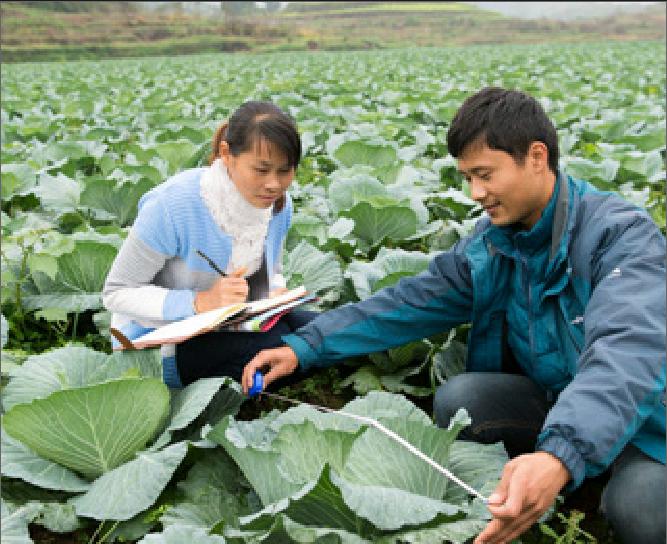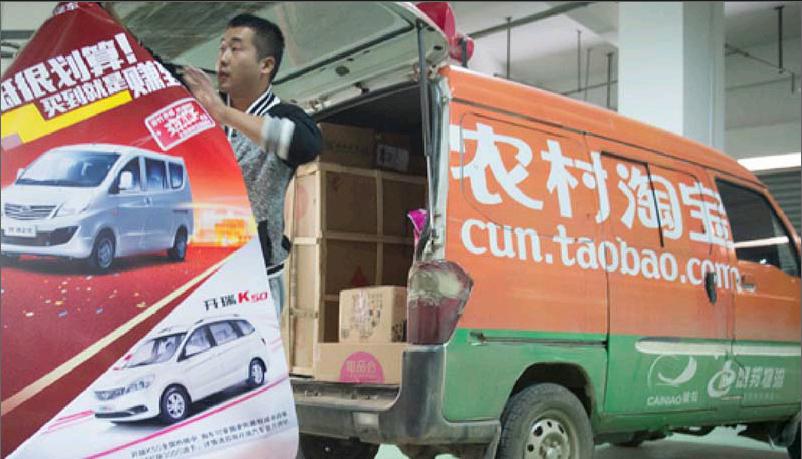The Age of E-Agriculture
2016-07-01ByGeLijun
By+Ge+Lijun


This is the season of brisk sales for vendors selling watermelons from the back of small vans at road intersections or pavements. Of late, another way of reaching buyers is catching on—through online sales.
In Beijings Daxing District, technology is empowering farmers to sell their products online, a method that is more convenient, faster, and with better outreach.
According to some farmers, thanks to the Internet, all the watermelons they grew this summer have been booked by buyers even before the fruits have ripened.“Previously, we would have to wait for the ripening and then for buyers to come and take their pick. But selling watermelons through the Internet is much more convenient,” Wang Zhili, a 50-year-old farmer who began to sell fruits online since last year, told Beijing Review.
The online sale of fruits and vegetables is catching on in Daxing due to several factors. A part of its industrial area, the Beijing Central E-Commerce District, is being promoted as an e-commerce hub, especially after Premier Li Keqiang introduced the concept of Internet Plus last year—the use of the Web in traditional industries for better growth.
Over 1,000 e-commerce companies are operating in the e-commerce hub. This has resulted in the establishment of entire industry chain services in Daxing.
Last year, the Beijing E-Commerce Association and Beijing International Fair for Trade in Services organized the 2015 ChinaBeijing E-Commerce Conference, sponsored by the Beijing Municipal Commission of Commerce and supported by the Ministry of Commerce and the Peoples Government of Beijing. One aim of the conference was to bring farmers in contact with enterprises and boost a production and marketing model combining an agricultural base, online platform to market products, and consumers.
At the end of the conference, it was announced that the Daxing e-commerce hub would aim for online retail sales worth 200 billion yuan ($30.55 billion) in the 13th Five-Year Plan (2016-20) period. In the next five years, it would incubate over 1,000 innovative e-commerce companies and grow 10 global e-commerce enterprises with an export value of 50 billion yuan ($7.64 billion).
Loquats go online
It is not just in Beijing where farmers are learning to do things with a click of their mouse. Renshou, a county in Sichuan Province in southwest China, is known as the land of loquats.
In May 2014, the county formed an ecommerce association to introduce online selling and push up sales. Subsequently, Ganchang Xiaozhan (www.scgcxz.com), the countys own e-commerce platform, was created to sell its agricultural products.
In 2015, the website launched an online Loquats Festival, attracting buyers in droves. On the opening day itself, more than 5,000 kg of loquat were sold, generating over 200,000 yuan ($30,769).
Wang Weijin, Vice Secretary of the Renshou County Committee of the Communist Party of China, told Peoples Daily that Renshou has over 400 administrative villages, each with its own distinctive products, like loquats, pears and even fish. The government is promoting these local products online. It has integrated farming stores and is promoting cooperation between Ganchang Xiaozhan and China Post and e-commerce giant JD.com to reduce logistic costs. It has also established a training course to teach farmers how to use websites for online marketing.
However, there are still some bottlenecks in promoting rural agricultural e-commerce. Statistics show that nearly 38,000 administrative villages in China still dont have access to broadband Internet. Almost 70 percent of Chinese farmers have no access at all to the Internet.
At the Internet Plus Agriculture conference held by the Ministry of Agriculture in April, Qu Dongyu, Vice Agriculture Minister, said there are two ways to solve the problems. First, infrastructure has to be created and improved. This includes communication, roads and logistics. Second, the gap between farmers and modern technology has to be bridged by providing them with training.
E-commerce in villages
Some e-commerce enterprises have already forayed into rural markets. Jin Jianhang, President of the Alibaba Group, announced at a conference in Fujian Province on March 28 that his group is constructing a new rural commercial infrastructure network.
The group launched the “10,000 Counties and Villages” project in October 2014, investing 10 billion yuan ($1.6 billion) to build a rural e-commerce service system that will cover over 1,000 counties and 100,000 villages in three to five years. The group is also building e-commerce operation centers in counties to handle logistics, training and inspection agencies. There will be smaller centers in the villages to mainly look after local product purchases and help farmers open online stores.
Liu Xianghao lives in Shandong Province in east China. He sells dry fish, shrimp and jellyfish through the local village center. For that he has to give details of his products—quantity, price and product description. The village center then sends staff to his house to photograph the items and agree on their price. The photographs are soon posted on a website for farmers and Liu waits for orders. When the orders come, they pack the stuff and deliver the products to buyers.
According to Alibabas statistics, by the end of March, there were 14,000 such village centers in China providing e-sale services.
Though its a good start, rural e-commerce is still in its infancy. According to the statistics released by the Ministry of Agriculture in 2015, online agricultural transactions account for less than 5 percent of overall agricultural sales.
However, the potential is there and the government is trying to tap into it. On May 12, the Ministry of Agriculture in association with seven departments published the Three-Year Action and Implementation Plan of the Internet Plus Modern Agriculture, which emphasizes rural e-commerce promotion. The plan says more networks, logistics and infrastructure will be put in place.
“Rural e-commerce will not only promote the sale of agricultural products but also the transformation from ‘basing sales on production to ‘basing production on salesprospects,” Vice Agriculture Minister Qu said. “During the 13th Five-Year Plan period, agricultural e-commerce will continue to maintain high-speed development.”
